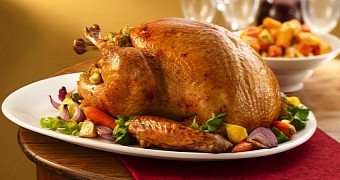Thanksgiving is just around the corner, which can only mean one thing: folks will once again take the time to give thanks for all the blessings that have so far been bestowed upon them and praise the stars for shining down on them.
Also, a heck lot of turkeys are about to be roasted, drowned in gravy and eaten. The thing is that, according to scientists with the Bingham Young University in the US, there's more to these birds than their exquisite taste.
Thus, these researchers claim that, apart from bringing happiness to people's taste buds and stomachs, turkeys can literally save lives. More precisely, evidence at hand indicates that these birds might hold the key to fighting all sorts of infections.
Crash course in turkey biology
In a recent paper in the Journal of Bacteriology, Bingham Young University microbiologist Joel Griffitts and fellow researchers explain that, as shown by investigations carried out in recent years, turkeys are unique in that they produce a potentially life-saving antibiotic.
This antibiotic is named MP1. The scientists go on to detail that it is produced by a bacterium dubbed Strain 115, and that, structurally-wise, it is surprisingly complex. Apparently, it is precisely because of its complexity that the antibiotic is not yet employed to fight infections on a large scale.
Having taken the time to study the biological processes through which the Strain 115 bacterium in turkeys produces the MP1 antibiotic, the Bingham Young University researchers found that this one teeny tiny microorganism is way smarter than some might assume.
Apparently, the bacterium doesn't just produce the antibiotic. If this were the case, the MP1 would surely kill it shortly after. On the contrary, it also produces a self-protecting agent that makes it immune to the antibiotic. What this means is that the MP1 only gets to kill other microorganisms that might dare infect the bacterium's host turkey.
Simply put, here's how this biological mechanism works: Strain 115 populates turkeys, which means that, if it wants to stay alive, it needs to protect the birds. Hence, it has evolved to produce the very potent MP1 antibiotic. However, to avoid being slaughtered together with other invaders, it also coughs out an agent that acts sort of like its bodyguard.
Why we should be thankful for turkeys
The Bingham Young University scientists behind this research project say that, with a little bit of luck, it might be possible to use the turkey bacterium Strain 115 and the MP1 antibiotic it produces to fight all sorts of infections in humans.
More precisely, the researchers claim that the MP1 antibiotic could help treat Staphylococcus aureus infections, which affect the respiratory tract and the skin, strep throat, i.e. an infection whose symptoms include fever, sore throat and enlarged lymph nodes, and even gastrointestinal conditions. In fact, the antibiotic is said to have the potential to fight about half of all infectious bacteria.
“The good bacteria we’re studying has been keeping turkey farms healthy for years and it has the potential to keep humans healthy as well,” explains microbiologist Joel Griffitts. “Our research group is certainly thankful for turkeys,” he adds.

 14 DAY TRIAL //
14 DAY TRIAL // 



